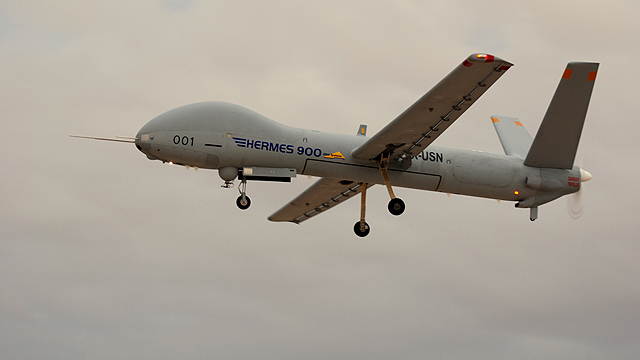The Jewish State’s largest private defense contractor seeks to expand into commercial markets by adapting their advanced military technologies for the public sector.
By Reuters
For two decades, Israeli defense contractor Elbit Systems has designed some of the world’s leading weapons systems. But now it has its sights set on a somewhat different market – electric buses.

Elbit Systems Hermes 900 UAV
This venture from Israel’s largest listed defense company, whose drones and surveillance systems are top sellers around the world, is part of a broader strategy to use its military expertise to break into civilian markets.
It may seem a risky foray into a competitive market, but Elbit has a strong track record for adapting its technologies – often developed in secretive labs that employ cutting-edge research – into new applications.
Last year, for example, it unveiled a commercial product for airline pilots, a wearable head-up display called Skylens that assists in take-off and landings in low visibility conditions. It was based on a technology used by air force pilots.
This time the electronics company has landed on high-performance batteries suitable for electric buses, a growing market as public transport networks boom in places like China and providers look for alternatives to fossil fuels.
What electric buses need are supercapacitor batteries – efficient storage devices that can be rapidly charged, can deliver high power and have a long lifespan.
But the bus route had an unlikely starting point.
“We had looked into developing energy weapons, like high power lasers that would use supercapacitors. And from there we looked to branch out with other applications that have potential for financial growth,” said Yehuda Borenstein, head of the company’s energy systems unit.
Elbit would not disclose how much it is investing in the buses venture, or revenue forecasts, but it plans to have a commercially viable version ready by the end of 2016. It is also working on a similar-style battery for a car starter motor, for which a pilot production line will be finished by the end of the year.
Charging dilemma
Since buses run along fixed routes for fixed amounts of time, the key is to be able to charge their batteries rapidly in the down-time, even in the pauses along a route. The problem with supercapacitors, however, is their cost and their weight, which can be prohibitive.
Yet for those that manage to crack the problem, there is money to be made: the hybrid and electric bus market is still in its early stages, but it is expected to boom over the next decade to over $100 billion a year in terms of revenue, according to IDTechEx, a group that researches emerging technologies.
Around half of that revenue will come from batteries sales, Borenstein said. A range of companies are already in the market, taking varying approaches to the challenge.
Swiss firm ABB has developed technology that can charge a full-sized electric bus during ordinary stops, though it requires the installation of chargers along the route.
Chinese smartphone maker ZTE Corp is planning pre-commercial trials of wireless charging for public transportation in 50 to 100 Chinese cities this year. Another Chinese company, BYD , which is backed by US investor Warren Buffett, recently unveiled a long-range electric coach bus.
Elbit’s solution to the battery weight problem is a hybrid supercapacitor – combined with a lithium ion battery – giving it both the high energy density of a conventional battery and power of a supercapacitor.
Borenstein said the battery will weigh just one tonne, making it less expensive and freeing up room for more passengers.
Elbit, which was founded in 1996 and is one of several companies in Israel looking to use their military capabilities to compete in civilian markets, wants to raise the revenue it generates from civilian commercial products from 10 percent of total revenue to about 20 percent within five years.
Its total sales rose 1 percent in 2014 to $2.95 billion and as of the end of the year it had a backlog of orders totaling $6.3 billion, most from abroad.
View original Ynet publication at: http://www.ynetnews.com/articles/0,7340,L-4655297,00.html







 Israeli New Shekel Exchange Rate
Israeli New Shekel Exchange Rate